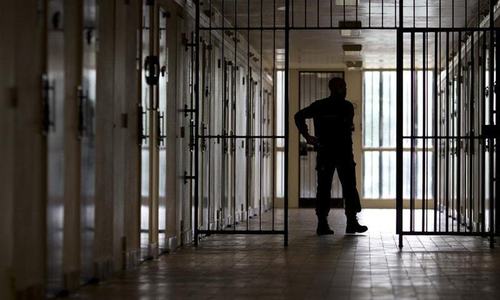PESHAWAR: The Peshawar High Court has directed the home secretary to decide within a monththe plea of a convicted prisoner for release on probation over good conduct.
A bench consisting of Justice Lal Jan Khattak and Justice Shakeel Ahmad disposed of a petition filed by prisoner Salamatullah against the failure of the home secretary to decide his probation ‘representation’ filed over two years ago under the Good Conduct Prisoner’s Probational Release Act, 1926.
It ruled that an early decision on the representation/appeal of an aggrieved person was an inherent right of every citizen and the relevant public functionary should not keep the representation/appeal of an aggrieved person undecided for an indefinite period.
The bench observed that the authority, officer or person making any order or issuing any direction should provide a copy of the order to the person affected prejudicially, and he was also supposed to give reasons in support of the decisions, orders, especially when someone was deprived of his vested right.
Rules petition can’t be kept undecided for indefinite time
The court added that a copy of its orders should be sent to the chief secretary and administrative secretaries of the province for compliance in future.
“It has been statutorily provided that every public functionary shall exercise the jurisdiction vested in it reasonably, fairly, justly and for the advancement of the purpose of the enactment,” it ruled.
Lawyer Ghulam Mohiuddin Malik appeared for the petitioner, while additional advocate general Syed Sikandar Hayat Shah represented the provincial government.
The petitioner was arrested on June 14, 2011, by the Anti Narcotics Force on charges of drug trafficking and a case was registered against him at the ANF police station under Section 9-C of the Control of Narcotics Substance Act.
The petitioner was convicted and sentenced to life imprisonment by the special court (control of narcotics), Peshawar on Oct 18, 2012.
The court had extended him benefit of section 382-B of Code of Criminal Procedure under which his pre-conviction period spent in prison has to be counted in the prison term.
His conviction was also upheld by the superior courts, thus his conviction and sentence had attained finality.
The petitioner had earlier filed an identical petition before the high court in 2018 requesting for his release on probation on account of his good conduct.
However, the high court had disposed of that petition on Dec 20, 2018.
The court had declined to issue his release order firstly, on the ground that he had not served out 10 years of his substantive sentence, and secondly, he had not exhausted the alternate remedy provided under section 2 of the Good Conduct Prisoner’s Probational Release Act 1926.
In pursuance of the earlier judgment, the petitioner and his wife had filed representations for the redressal of his grievance before the home secretary but it hasn’t been responded till date.
The bench ruled that Islamic injunctions and teachings granted to every aggrieved person the right to representation regarding his grievance and he was free to lodge an appeal against an order affecting him adversely.
It added that it was his right that his appeal would be adjudicated without inordinate delay by an independent tribunal and he could, under no circumstances, be stopped from exercising his basic right.
In the verdict authored by Justice Shakeel Ahmad, the bench referred to several instances from the Islamic history related to the issue and observed that those instances highlighted the principles that there existed in the aggrieved person the unfettered right to lodge a protest or prefer an appeal before a higher authority with the object of seeking redressal of grievance; and, the authority hearing the appeal was under obligation to decide the same.
It observed that an arbiter was required to give due weight to violation of human rights and human dignity.
The bench added that the superior judiciary, while interpreting various provisions of law, had held that right of appeal, representation, show cause notice was inherent in Islamic teachings.
Published in Dawn, August 5th, 2021















































Dear visitor, the comments section is undergoing an overhaul and will return soon.